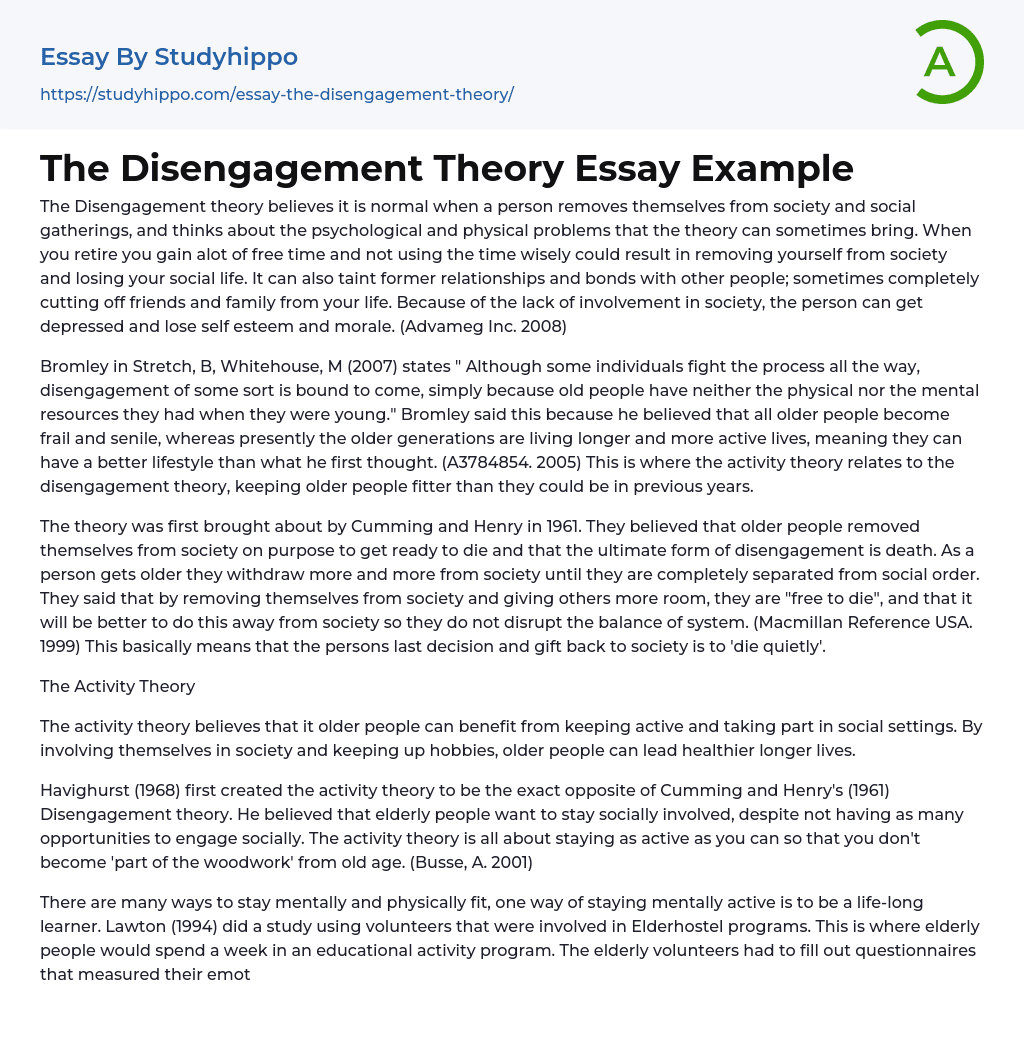The Disengagement theory believes it is normal when a person removes themselves from society and social gatherings, and thinks about the psychological and physical problems that the theory can sometimes bring. When you retire you gain alot of free time and not using the time wisely could result in removing yourself from society and losing your social life. It can also taint former relationships and bonds with other people; sometimes completely cutting off friends and family from your life. Because of the lack of involvement in society, the person can get depressed and lose self esteem and morale. (Advameg Inc. 2008)
Bromley in Stretch, B, Whitehouse, M (2007) states " Although some individuals fight the process all the way, disengagement of some sort is bound to come, simply because old people have neither the physical nor the mental
...resources they had when they were young." Bromley said this because he believed that all older people become frail and senile, whereas presently the older generations are living longer and more active lives, meaning they can have a better lifestyle than what he first thought. (A3784854. 2005) This is where the activity theory relates to the disengagement theory, keeping older people fitter than they could be in previous years.
The theory was first brought about by Cumming and Henry in 1961. They believed that older people removed themselves from society on purpose to get ready to die and that the ultimate form of disengagement is death. As a person gets older they withdraw more and more from society until they are completely separated from social order. They said that by removing themselves from society and giving others more room
they are "free to die", and that it will be better to do this away from society so they do not disrupt the balance of system. (Macmillan Reference USA. 1999) This basically means that the persons last decision and gift back to society is to 'die quietly'.
The Activity Theory
The activity theory believes that it older people can benefit from keeping active and taking part in social settings. By involving themselves in society and keeping up hobbies, older people can lead healthier longer lives.
Havighurst (1968) first created the activity theory to be the exact opposite of Cumming and Henry's (1961) Disengagement theory. He believed that elderly people want to stay socially involved, despite not having as many opportunities to engage socially. The activity theory is all about staying as active as you can so that you don't become 'part of the woodwork' from old age. (Busse, A. 2001)
There are many ways to stay mentally and physically fit, one way of staying mentally active is to be a life-long learner. Lawton (1994) did a study using volunteers that were involved in Elderhostel programs. This is where elderly people would spend a week in an educational activity program. The elderly volunteers had to fill out questionnaires that measured their emotions, psychological well-being, how much they would participate, and what had most control over their life. The research discovered that by participating in a variety of activities, they positively improved their contentment, hostility, depression and shyness.
- American Dream essays
- Barriers To Entry essays
- Capitalism essays
- Central Bank essays
- Compensation essays
- Consumerism essays
- Economic Development essays
- Economic Growth essays
- Economic Inequality essays
- Economic System essays
- Economy essays
- Employment essays
- Export essays
- Finance essays
- Free Trade essays
- Gross Domestic Product essays
- Human Development essays
- Income Inequality essays
- Industry essays
- Inflation essays
- International Business essays
- International Trade essays
- Macroeconomics essays
- Materialism essays
- Max Weber essays
- Microeconomics essays
- Minimum Wage essays
- Monetary Policy essays
- Monopoly essays
- Pricing essays
- Profit essays
- Recession essays
- resources essays
- Taxation essays
- Trade essays
- Unemployment essays
- Warehouse essays
- World economy essays
- Old Age essays
- Abnormal Psychology essays
- Abraham Maslow essays
- Attachment Theory essays
- Authority essays
- Behaviorism essays
- Classical Conditioning essays
- Cognitive Psychology essays
- Counseling essays
- Developmental Psychology essays
- Educational Psychology essays
- Erik Erikson essays




